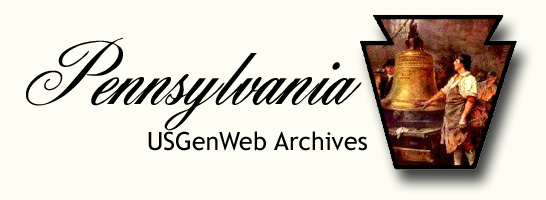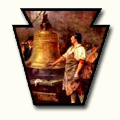| |
A History of Pittsburg and Western Pennsylvania Troops in the War
By John V. Hanlon (Copyright 1919 by The Pittsburg Press)
Chapter X
(The Pittsburg Press, Sunday, March 9, 1919, pages 70-71)
Names in this chapter: Martin, Aiken, Thompson, Lamb, Davidson, Glendenning,
Feiley, Kelley, Leonard, Williams, Prager, Boden, Kegler, Jordon, Hartung, Iland,
McGinnish, Frosch, O’Neil, Gunn, Murray, Broadbent, Onyx, Maxwell, Smith, Falls,
Baker, Biemuller, Curry
The Yanks from Pittsburg and Western Pennsylvania performed many acts of
gallantry and daring before Fismette which was one of the bitterest conflicts of
the entire war. The Germans were determined not to budge from the town, but our
boys were just as determined that they would have to move on northward and so it
was a battle to the death. The Pennsylvanians suffered many casualties during
the days while the fighting raged along the Vesle at this point.
THE OLD EIGHTEENTH OF PITTSBURG WAS THE CHIEF BATTERING RAM WHICH KEPT HAMMERING
AT FISMETTE DURING THOSE STRENUOUS DAYS WHEN THE YANKS WER TRYING TO DISLODGE
THE BOCHE FROM THIS STRONGHOLD ALONG THE NESLE. THE BATTLE OF FISMETTE LASTED
FOR DAYS AND WAS ONE OF THE MOST STUBBORN CONFLICTS OF THE WAR. THE GERMANS
SOUGHT BY EVERY POSSIBLE MEANS TO STAY THE ADVANCE OF OUR DOUGHBOYS, AND THE
BATTLE LINES SWAYED BACK AND FORTH FROM ONE SIDE OF THE RIVER TO THE OTHER.
PITTSBURG AND WESTERN PENNSYLVANIA SOLDIERS PERFORMED MANY HEROIC ACTS DURING
THIS INFERNO OF FIGHTING AND A LARGE NUMBER OF OUR BOYS WERE EITHER WOUNDED OR
KILLED DURING THE VARIOUS ACTIONS.
Odds against them never seemed to count with the
Pennsylvania soldiers. The heroes of the Twenty-eighth division seemed reckless
at times in the manner of their advance against the foe, particularly when the
latter was in superior force and in an apparently incontestable position. In
this seemingly uncalled for daring, however, there was always a deep purpose,
the like of which the Hun has always been incapable of comprehending and which
the writer has not even a remote intention of trying to explain so that its
intricate principles might penetrate the solid ivory dome of the Boche.
When baseball becomes Germany’s national pastime and
even the windows along the Wilhelmstrasse are endangered by the ambitious
efforts of irrepressible sandlotters with visions of being future big league
phenoms, when football demands the same autumnal attention in Prussia and
Bavaria that it does in Pennsylvania and Georgia, then and not until then will
the German intellect be capable of receiving impressions and reaching
conclusions comparable with those of the doughboys. When the Wagners and Cobbs,
the McLarens and Guyons of Germany, if there are any, are accorded in the
Fatherland the homage which for half a century has been paid there to silly
crown princes and strutting military officers, then only can the German mind
hope to attain the viewpoint which swept the gallant old “Fighting Tenth”, the
wonderful old Eighteenth of Pittsburg, the unyielding old Sixteenth, N.G.P., and
other Western Pennsylvania regiments over the top and forward with a fury that
no human defenses could withstand.
ALL IN THE GAME
At the risk of plagiarizing the famous remark of a
certain British commander, it may be said that American’s part in the world war
really was played during the past 20 years on more than 1,000 baseball and
football fields throughout the United States. The initiative and skill, the
never-say-die spirit and the inherent knowledge of strategy necessary to win
were cultivated over here. When the boys went “over there,” they simply took
those qualities with them. Being what they were, nothing less than what they did
could have been expected of them. The quarterbacks among them knew “enough to
aim their heaviest blows at the weakest spots in the enemy’s front” without
waiting to be told by their officers to do so. Outguessing the enemy and
outfighting him aggressively was exactly what their coaches had drilled into
them for years. They knew that a hit in a pinch was worth 10 homers when their
team was away out in front. Trench raiding wasn’t so much different from base
stealing, when you look at it that way. The idea was to catch the opponent off
his guard and go to it like a flash.
German prisoners have admitted that they had become so
accustomed to fighting French and English, with time out for meals, that they
simply couldn’t adjust themselves to the American style of fighting. Of course
they couldn’t. Nobody ever expected them to. When they had numerical superiority
on their side, not to mention better position, they methodically calculated that
the Yanks would let them along for the time being. They fooled themselves and
lost the war. The Western Pennsylvania troops outgamed and outpointed the crack
Prussian Guards at every point of contact, the dash and aggressiveness of the
Keystoners seeming marvelous in the eyes of the British and French observers but
really not so very wonderful in the eyes of the folks back home, who knew all
along just what kind of men they had sent into the fray.
Lieut. Col. Edward Martin of Waynesburg, commander of
the old “Fighting Tenth,” who is authority for the statement that, in the battle
of the Argonne forest, the Americans “took a gambler’s chance on ending the war
in 1918,” and he ought to know, for he was in the thick of it, also had
something to say about the athletics when he returned to his home town.
WHAT FOOTBALL DID
Commenting on the wonderful war work and fighting
qualities of Capt. “Biddy” Aiken and Maj. Joe Thompson, two famous W. & J.
college and Pitt university football stars of former years, Col. Martin declared
emphatically that the football knowledge of these two men counted for a great
deal on the battlefield. “I certainly wish that every officer and man in any
regiment had played football at some time in his life,” Col. Martin told a
little group of friends soon after his arrival home. From the tone of his
comment, it was inferred that he agreed, to some extent at least, with the views
set forth above.
One of Western Pennsylvania’s great athletes who gave
his live in France that freedom might not perish from the earth, was Lieut. Levi
Lamb, son of Mr. and Mrs. H.L. Lamb of California, Pa., a little state normal
school town up the Monongahela river about 50 miles from Pittsburg. A few years
ago he was a star tackle on the Pennsylvania State college football team and was
the champion wrestler of that college. Previously he had played baseball and
football at the Southwestern State Normal school, California, Pa., and at Grove
City college. Being only six feet and six inches in height, he was
affectionately knows 10 years ago in his home town as “Little Levi.” That he
died bravely on the field of honor is attested by letters from his superior
officers and that any Hun who grappled with him must have fared badly will be
attested by hundreds of men who have opposed him in friendly athletic rivalry in
Western Pennsylvania in the past decade. A gold star in his honor adorns the
service flag of Penn State and his memory will never grow dim at that famous old
school.
Literally, thousands of high school and college
athletes from Western Pennsylvania won imperishable renown “over there.”
Hardened by intensive military training on this side of the Atlantic, under the
tutelage of experienced French, Canadian, British and American army officers,
they were fit for the fray. Is it a matter for wonder then, that Europe respects
the American soldier and the humblest American citizen now as never before?
MORAL SIDE SHOWN
Aside from the purely military and economic or
commercial advantages gained by winning the war, there is a moral side to it
all. Never again will the Kaiser, or any other European monarch, delude himself
and his subjects into the belief that “Americans won’t fight.” But that is not
all. The doughboys took with them to France, Belgium and Germany the spirit of
fair play which is the essence of all real American sportsmanship. Not only did
they reverence womanhood and seek to protect children and old age, as they had
been admonished (rather than ordered) by Pershing to do, but they accorded even
the enemy whatever admiration they could when his acts justified it, which was
seldom. When Col. Martin tells how a little group of American soldiers applauded
the pluck of a German aviator attacking an allied observation balloon, when the
odds were against the attacker, he tells what is at first blush incredible. But
it really happened and, on second thought, it is not so remarkable.
There have been times in America when a visiting
outfielder has been given a hand by the home crowd for making a marvelous
shoe-string catch or a visiting slugger has been given his due even though he
clouted a circuit smash off of the home pitcher’s delivery. Probably it was that
same send of giving honor where honor was due that led the Yanks to applaud the
Hun flier, even though nine-tenths of the German fighters were rotten at heart
and deserving of no comparison.
In the second charge of the Americans during their
attack on the town of Fismette, Sergt. Clarence Davidson of Tarentum was
wounded. He was leading a platoon with great bravery at the time and, according
to accounts of the occurrence given by some of his comrades, his coolness and
courage under fire proved a remarkable inspiration to his men. Just before that,
while talking to a commissioned officer, Sergt. Davidson witness the death of
Lieut. Glendenning of Pittsburg. The Pittsburger, who was not far from where
Sergt. Davidson and the officer were standing, was killed by the explosion of a
German shell.
HOW THOMPSON DIED

Capt. Orville R. Thompson of Pittsburg, commander
of Co. M, One Hundred and Eleventh, lost his life during these assaults on
Fismette. Capt. Thompson had been ordered to take his company and advance on a
German position just outside Fismette and the men with their commander in the
lead went over the top at 6:30 a.m., Aug. 11. The enemy was in a well fortified
and well wired place and capable of offering a strong defense. It was situated
on the top of a little knoll and this made its capture doubly hard because the
Boche would sweep the Americans with rifle and machine gun fire as they charged
up the slope. Capt. Thompson was about 15 yards in front of his men, urging them
on. He had declined to remove the marks which designated him as a commissioned
officer, thus making himself a target for which the German sharpshooters always
looked. He had reached the barbed wire when a sniper’s bullet hit him and he
fell without a groan.
Capt. Thompson was a commander very much loved by his
men as he was always out in front whenever there was hazardous work to be done.
He would never ask a man to take any chances he would not assume himself. He was
a wonderful soldier, according to the testimony of the men of his command, and
by his courage and daring he set an example that was emulated by the entire
company.

Private George Feiley of St. Mary’s and Private J.
Kelly of Pittsburg, both of Co. M, performed distinguished service in this
fight. Private Feiley was an automatic rifleman and he was right up in the thick
of it when a bullet hit him in the neck. Although suffering terribly from the
wound he refused to leave his gun and his comrades had to drag him away. Private
Kelly then took over the automatic rifle position and hammered away at the Boche
until the company got back to safety. He returned with several wounds and the
gun.

Aug. 12, the Germans put forth a mighty effort to drive
out of Fismette the Americans who had managed to gain a foothold there and after
putting an intense bombardment on the town, followed by a rolling barrage, they
advanced in force. There were too many of the enemy for the small bank of
doughboys to withstand the assault and so to save as many lives as possibly
orders were issued for our men to retire. But it was a stubborn retirement and
they caused the foe many casualties while being forced out of the town.
INFERNO IN FISMETTE
When the Americans were again across the river from
Fismette and the town was in the hands of the Boche the Franco-American
artillery was given an opportunity to make life unpleasant for the enemy. The
artillery had been massed to protect the advance of the Pennsylvanians and when
the guns unloosed their iron messengers of destruction, Fismette became a
veritable inferno. It was not apparent that the Germans could not endure such a
concentrated bombardment for long. Fismette proper was made untenable for the
kaiser’s hordes and then the Americans set about planning for another attempt to
capture the place.

2nd Lt. Harry E. Leonard
The next advance of Fismette was led by men from Co. A,
One Hundred and Eleventh infantry, in charge of Capt. Archibald Williams and
Lieut. H. E. Leonard, both of Pittsburg. This unit swam and waded the Vesle
under terrific shell and machine gun fire, taking to the water rather than use
the bridges for the reason that the enemy was centering his fire upon these
structures. Our men were able to gain a foothold on the Fismette side, but they
were in a precarious condition because they were unsupported on the flanks. In
order to gain some protection from that hail of steel they plunged forward into
a little ravine, only to find that they were in the midst of a gas cloud. It
seems that much of the gas with which the Germans had been sending into the town
had, for some reason or other, settled in this ravine.
And it was a terribly mixture of all the deadly gasses which the Germans used.
Mustard, sneeze, tear and chlorine gas made up one of the worst examples of Hun
deviltry of this form which our boys had met. Thus they were forced to fight
with gas masks, but they went forward on the run, cleaning out nest after nest
of machine guns. The Germans would stand to their posts and fire until they
caught the glitter of our bayonets and then they either attempted a quick
retreat or uttered their usual plea for mercy. In many instances they neither
escaped nor had their “kamerad” cries given heed. The Americans were too busy to
bother much with prisoners and they still had many scores to settle.
PRAGER IS CITED
By this time a few more men of the One Hundred and
Eleventh had managed to cross the river in support of Co. A, and it was during
this hard fighting that Sergt. Benjamin Prager, Co. E, 240 Southern Ave., Mt.
Washington, performed deeds of coolness and bravery under fire which won for him
official citation and a recommendation for a commission. Lieut. James C. Boden,
who made the recommendation set forth that “Sergt. Prager’s courage and
leadership was unexcelled by any other soldier in command. As a leader he has
been unexcelled by any other officer under my personal observation. He has never
failed to carry out orders and in the absence of a superior officer had used his
own initiative in commanding men, strengthening positions, etc.”
The sergeant delivered his company under a heavy
barrage to reinforce Co. G without a casualty and the same day at Chateau de
Diable, near Fismette, he took charge of the left flank of Co. E which was under
heavy machine gun fire, and established a sniper’s post in a building from where
our riflemen picked off great numbers of the enemy and especially machine
gunners. He was wounded while directing his men but gamely dressed his own wound
and remained at his post until relieved.
His wound sent him to the hospital for two months and
it was Nov. 10 before he was able to rejoin his command.
During the fighting on Aug. 12, Sergt. Arnold H. Kegler
of Pittsburg, Co. M, One Hundred and Eleventh, was wounded severely while
performing an act of bravery in attempting to rescue a wounded comrade who was
in a shell crater in No Man’s Land. Sergt. Kegler notices a soldier in the
crater and together with Corp. Frank Aiken and Corp. Jordon of Pittsburg decided
to get him out. Crawling on hands and knees while machine gun bullets whizzed
about their heads they finally reached the edge of the crater and dragged the
wounded soldier back to the American Lines. Just as they reached the line a big
German shell exploded in their midst, killing Corp. Aiken and wounded Corp.
Jordon and Sergt. Kegler. Sergt. Kegler was blown up in a small hill, with
several pieces of shrapnel in his leg, but was able to crawl to a nearby house.
He remained there several hours before a patrol found him and removed him to a
dressing station.
WOULDN’T BUDGE
The manner in which this small force managed to win its
way into Fismette and stick there has been described “Like a policeman’s boot in
the door of a wrongdoer’s house.” They refused to budge an inch, although
treated to every form of diabolic, death-dealing device the Hun had to offer.
High explosive shells, all sorts of gas, furious infantry counter-attacks,
bombs, and machine gun bullets made the performance of the continuous variety,
but the doughty Pennsylvanians did not have the slightest intention of being
driven out.
While all this battle for supremacy was under way, the
foe had demolished every bridge across the river except on and that was so badly
damaged as to be considered unsafe, and thus our men in the town were
practically cut off from their comrades on the other side of the river. All the
little force could do was to fight grimly until it was possible to get
reinforcements across. Many of the men had been wounded and a group of 28 sorely
in need of hospital attention had been gathered in the cellar of a building to
await the arrival of ambulances from across the river. Their comrades realized
that every man in the little group of wounded must be given hospital treatment
as soon as possible, in order that their lives might be spared, and how to
evacuate them was, indeed, a problem. It seemed almost impossible to get an
ambulance across that lone bridge which was even then the target of the Boche
artillerymen. And it was then that some of the Pennsylvania doughboys rose to
the pinnacle of human daring; they became supermen, performing the most arduous
and perilous tasks with no thought of fear and emblazoned their names at the
very top of the scroll of fame.

Maj. Edward M. Iland
To the men of the Twenty-eighth division’s sanitary
train came word of these wounded in the cellar over in Fismette. The house had
been struck five times by shells and it was necessary time and again to clear
the debris off the wounded. Capt. Charles Hendricks, of Blairsville, together
with a few men, remained in the building to look after the wounded and
frequently he and his men were buried under falling plaster and other materials.
After digging themselves out they would do likewise for the 28 wounded lads.
This went on for four days and during all this time it had been absolutely
impossible to send assistance from across the Vesle.
HOW THEY WERE SAVED
Finally, the men of the ambulance companies attached to
the sanitary train decided that no matter what the enemy had to offer in the way
of destruction something had to be done to get those wounded men out of Fismette.
The advance party of the rescuers set out from Fismes in a touring car which
carried Maj. Frederick Hartung, Pittsburg; Maj. Edward M. Iland, Coraopolis;
Capt. George E. McGinnis of Philadelphia and Privates Walter Frosch and Walter
McGinnis, also of Philadelphia. All were members of the Medical corps.
Frosch was driving the car and they made a wild dash
down the road to the river in full view of many enemy gunners. Their only hope
was that speed might get them through. Their car was soon the target for the
enemy and how they ever escaped the rain of shells put upon that road is a
mystery. The car was hit several times, but Frosch kept right ahead oblivious to
the danger. Reaching the unsafe bridge they rushed across at top speed and
luckily the structure held. Then through Fismette the car dashed and up to the
building around which the big shells were falling thick and fast and in which
the wounded men were awaiting removal.
The ambulances on the other side of the river had been
made ready for a like dash when the signal should be given by Capt. McGinnis. At
this prearranged signal the ambulances were to dash from cover and attempt to
rush across the bridge just as the officers who had gone over in the touring
car. All these ambulances were marked conspicuously with the Red Cross, but that
did not deter the Boche from shelling them, indeed, it seemed to spur him on to
greater efforts to demolish these vehicles of mercy. The cars were manned mostly
by men from Philadelphia and vicinity, namely, James T. O’Neil of Alden; James
R. Gunn, Joseph M. Murray, Samuel Falls, Alfred Baker, Originnes Biemuller, John
Curry, Harry Broadbent, Raymond Onyx, all of Philadelphia; John F. Maxwell of
Williamsport and Albert Smith, of Frankford.


AMBULANCES CROSS
When the signal was given the ambulanciers rushed their
cars down the road to the shaky pontoon bridge and thence across the river and
although the Germans did their best to destroy the ambulances not one car was
hit. Up through Fismette the train rumbled and it was not easy going through the
little, narrow streets of the town half choked with debris at many points. The
drivers pulled up beside the temporary refuge for the wounded and with the
stretcher bearers leaped out and prepared to loan the men into cars and make
another dash back across the Vesle to the hospitals.


|
|












